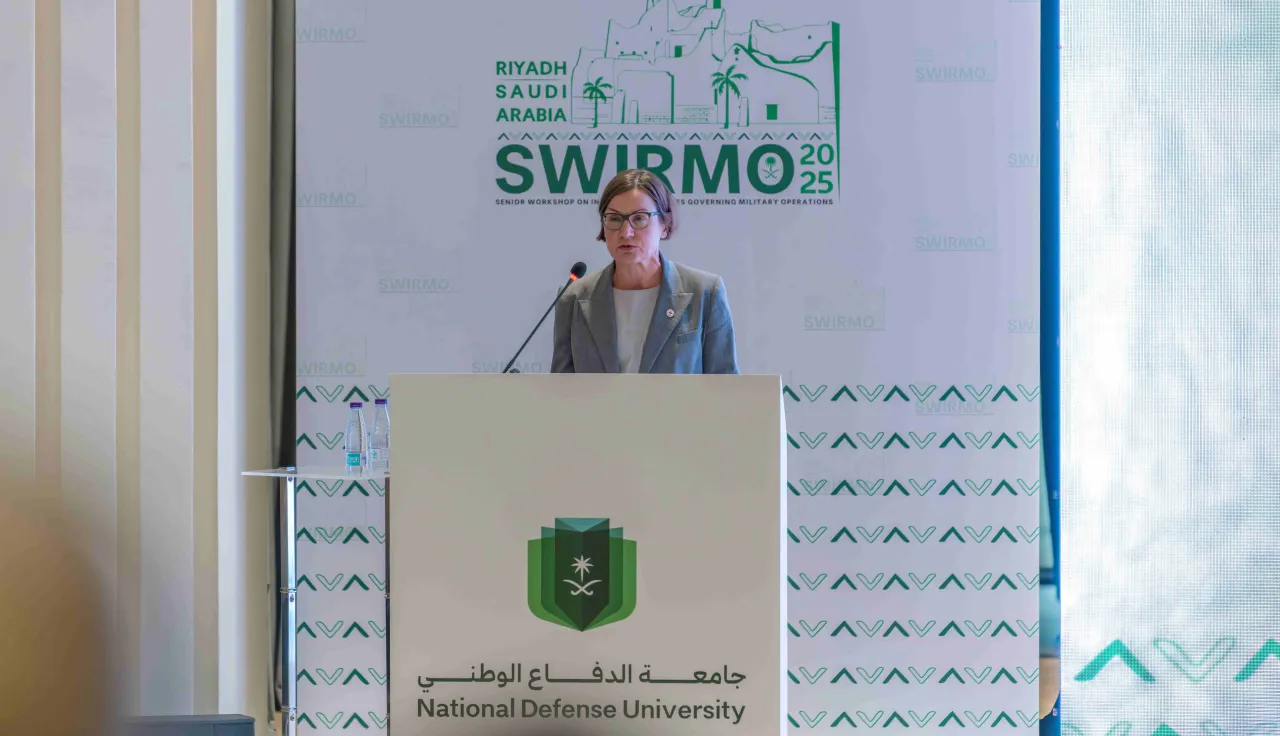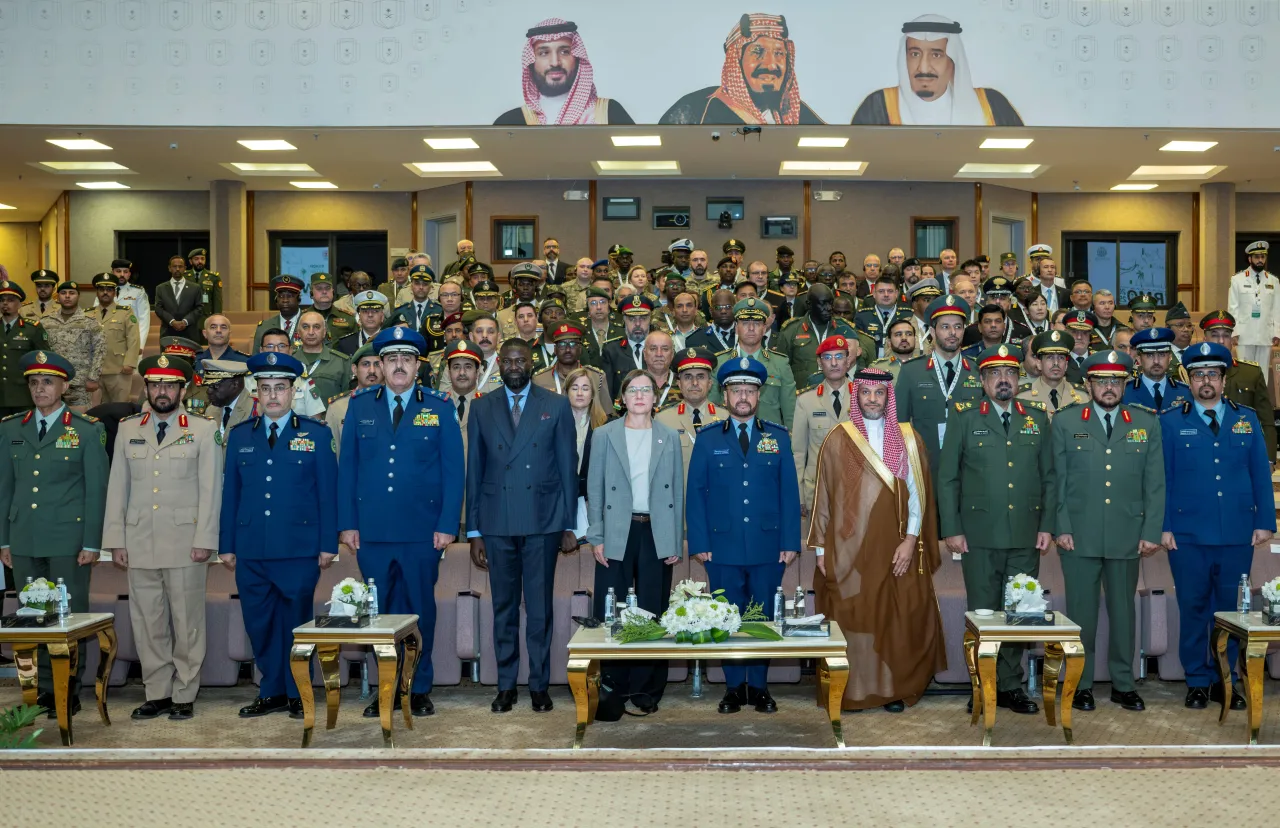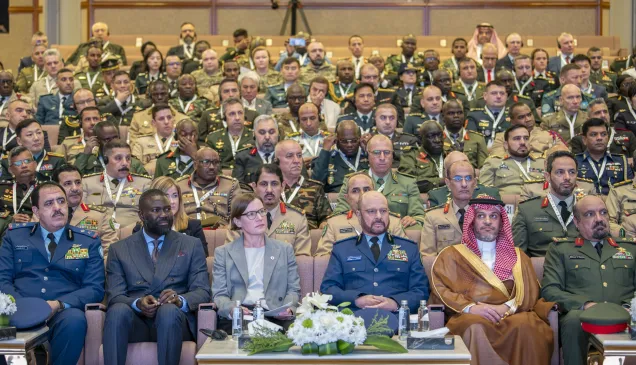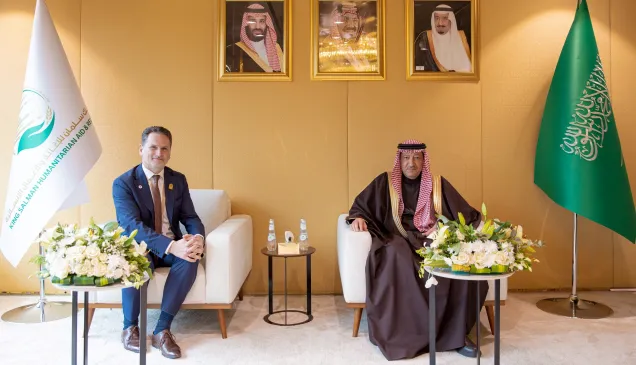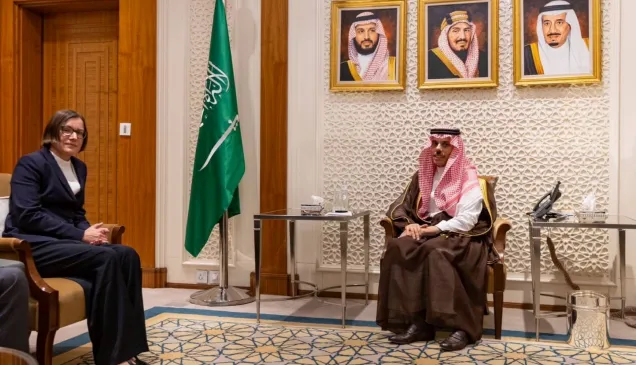Your Excellency,
Air Chief Marshal Fayyadh al-Ruwaili,
Chairman of the General Staff of the Armed Forces of the Kingdom of Saudi Arabia,
Generals, commanders, participants, distinguished guests,
It is a great pleasure and honour to join the opening of the 18th edition of the Senior Workshop on International Rules Governing Military Operations. I would like to extend my thanks to our Saudi hosts for their generosity and commitment in hosting this year’s event, and to all of you who travelled from near and far to be present.
This event stands as a testament to the universal nature of international humanitarian law (IHL).
Today, we are joined by 125 representatives from 90 countries. Among you are individuals who may be on opposite sides of conflicts at home, yet you are gathered here in a neutral space because of our shared responsibility to uphold and preserve the rules of war.
The concept of norms in war dates back millennia and can be found in nearly all ancient cultures and military traditions. Now primarily enshrined in the Geneva Conventions and their Additional Protocols, IHL binds states to uphold a minimum of humanity in war. Their obligations are not optional, nor are they contingent on how a war started. They apply equally no matter what side of the frontline one lives or fights on.
When IHL is respected, all sides benefit. Lives are saved.
Torture, sexual violence, hostage-taking, and starvation as a method of warfare are prohibited. Houses, hospitals, power plants, and schools are spared from hostilities. Those who are captured and detained are treated humanely, and the wounded and sick are cared for. Civilians receive humanitarian assistance and are not forcibly displaced from their homes.
And yet, in today’s wars, these lifesaving rules are often, too often, disregarded or twisted to mask the very violations they were meant to prevent. This not only irreversibly changes millions of lives today, but also tomorrow by laying fertile ground for future wars.
When atrocities are normalized, the guardrails preventing brutality in war are dismantled and terrifying standards for how wars can be fought cemented. By upholding IHL, states protect their own people and preserve the social fabric necessary for peace and stability.
Wars are also increasing not only in intensity, but in number. The ICRC now classifies approximately 130 armed conflicts around the globe. This is more than we recorded a year ago, and twice the number we saw 15 years ago. As senior military officers, you are the first to know that war comes at a tremendous cost.
More war and more brutality in war is a poisonous combination.
I know you will all recognise Carl von Clausewitz’s maxim that “war is merely the continuation of policy by other means.” Just as politics are embedded in how wars begin and end, they also shape how wars are fought. If we are to stem the tide of destruction and suffering that define today’s wars, leaders must make the rules that govern armed conflict a political priority.
This is why last September, the ICRC, together with Brazil, China, France, Jordan, Kazakhstan and South Africa, launched a global initiative to revive respect for the rules of war and elevate them to the political level.
The Kingdom of Saudi Arabia was the first country to join this global call. In the meantime, more than 90 countries have since joined us in this exceptional effort, with 27 states co-leading state consultations around some of the most pressing challenges facing international humanitarian law.
More than 130 states took part in these consultations, and I am encouraged that—contrary to what we see on battlefields—the overwhelming call was for interpretations of IHL that maintain the delicate balance between military necessity and humanitarian consequences. We saw a clear push to safeguard the fundamental objective to protect people in war.
These efforts will continue into next year and culminate in a high-level meeting to uphold humanity in war in 2026. I hope you will all join us in this exceptional effort.
As members and leaders of armed forces, you have an indispensable role in bringing IHL to life on the battlefield. It is your responsibility to plan for compliance and to ensure that when you direct military operations, you design and oversee them in ways that minimize the humanitarian consequences.
You are uniquely positioned to contribute to this initiative by bringing forward the real-world challenges you face as warfare continues to evolve. Your insights are essential in making this effort meaningful and grounded so that violations, and the immense suffering they inflict on civilians, are prevented rather than accepted as an inevitable side effect of war. The next round of consultations is starting, and I encourage you to connect with ICRC staff in the coming days for more information on how you can best take part and follow it.
Distinguished guests,
Making IHL a political priority also means ensuring any increases in defence spending also include investments in IHL compliance. States can invest more in defence, but they must also invest in creating a culture of respect for the rules of war. This culture of compliance needs to extend to all aspects of military preparedness from land, air, to sea to outer-space and the digital sphere
This includes training for military personnel on core IHL principles. It also means detailed strategic and operational planning to meet the specific obligations set out in the Geneva Conventions. States must not only understand these requirements conceptually but have systems and infrastructure in place that can be quickly activated if war breaks out.
For example, in international armed conflicts, prisoners of war and interned civilians are granted specific protections under the Third and Fourth Geneva Conventions. States must plan how they would establish internment camps that meet minimum standards for shelter, sanitation, food, water, and medical care.
Protected persons who find themselves in enemy hands must be allowed to remain in contact with their families.
National health systems must be ready to absorb high numbers of weapon-wounded and deal with conflict-related injuries. Mortuary and forensic capacity must be scaled up to ensure the dead are identified and treated with dignity, and people are prevented from disappearing in death.
At sea, this includes considerations for safeguarding civilian seafarers and merchant shipping, preserving the marine environment, and mitigating the impact of modern, large-scale military operations at sea on civilian populations and resources.
These are not systems that can be improvised when war begins. Delays in setting them up risk non-compliance with IHL and can exacerbate human suffering. They demand dedicated investment, both human and financial. You have to budget for the dissemination of international humanitarian law as an integral part of defence planning and resourcing to ensure they are effective.
We are very conscious that compliance with the law in your operations will not come without hard work to prepare your whole force to reflexively act within the law. Only by integrating IHL compliance into your doctrine, education, training and disciplinary systems, can it become an integral part of your operational military culture.
This also includes the weapons you choose to invest in and stockpile. Globally, we see states investing in drones, autonomous weapons systems, and artificial intelligence. While this new arms race raises serious humanitarian concerns, it does not render IHL obsolete.
The same rules apply to cyberwarfare and emerging weapons technologies as they have to all the weapons developments over the years and decades, and I am confident that they will remain relevant as technology changes. The nature of warfare may change, but the need to uphold humanity never changes.
Finally, the way wars are fought influence how they end.
As senior military officers, you play a fundamental role in preserving pathways back to peace. When entire communities and entire territories are reduced to rubble, recovery is far more complicated and costly. The trauma carved into the lives of civilians is deep, and the prospects for peace and reconciliation fade. When IHL is respected, suffering is reduced, humanity is preserved. The barriers that stand in the way of long-lasting peace are removed.
Distinguished guests,
As military commanders you face dilemmas in every operation. You have a responsibility to ensure that you lead those under your command to comply with the law and that the protection of civilians, of civilian infrastructure, of detainees and the wounded are at the heart of your decision-making. Your leadership is what can make the law an operational reality that prioritizes life over death and human dignity over dehumanization.
Thank you for taking part in this truly global event. Your presence alone symbolizes that IHL remains relevant and crosses all cultures, regions, and geopolitical divides.
I wish you all the best for your discussions in the coming days. Thank you.

